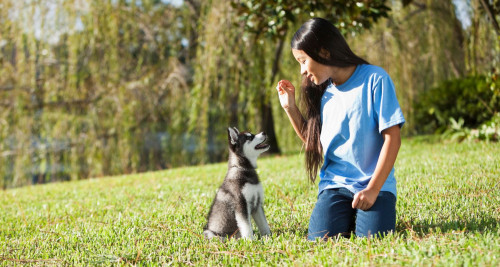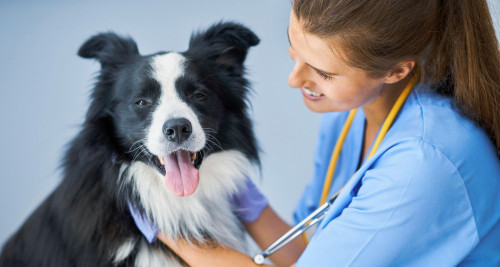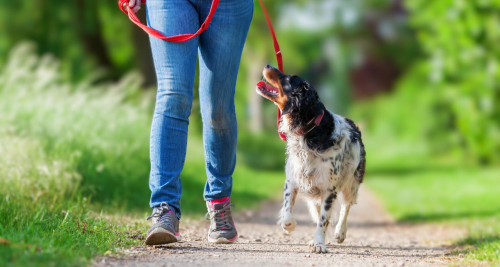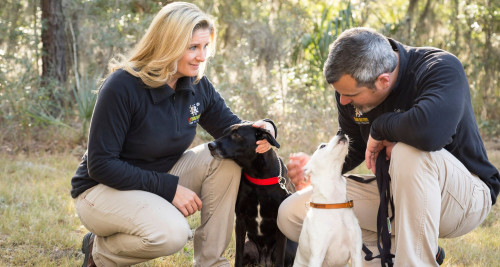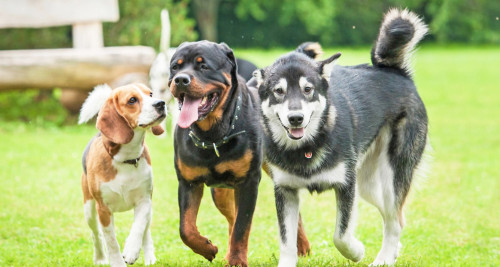Golden Retriever
These magnificent looking dogs are renowned for having one of the most stable temperaments of all of the breeds which is one of the reasons they are so popular around the world. Their lovable nature and overall compatibility with humans, other dogs and animals, is what makes a breed of dog that people love. They are also the least likely to be aggressive or anti-social.
The Golden Retriever is a large breed of dog (average 55 – 75 pounds) with a fun-loving nature that suits most people’s lifestyle. Because they learn quickly, they are great family pets and lifelong companions. They are strong dogs and hard workers whether they are hunting, guiding, servicing or performing search and rescue activities.
If there is a downside to this breed, it might be their coat type, the care it requires and the shedding from the dense undercoat. But this is a small price to pay for sharing your life with this magnificent breed of dog that ticks all the boxes when it comes to temperament.
Breed Traits and Characteristics
According to the American Kennel Club, here are some breed characteristic you can find in Golden Retrievers.
- Height
23-24 inches (male), 21.5-22.5 inches (female)
- Weight
65-75 pounds (male), 55-65 pounds (female)
- Life Expectancy
10-12 years
- Coat Type/Length
Double/Medium
-
100 Affectionate with Family
-
100 Good with Young Children
-
100 Good with Other Dogs
-
100 Trainability Level
-
60 Energy Level
-
20 Barking Level
-
80 Shedding Level
-
40 Drooling Level
The History of Golden Retrievers
Scotland
Golden Retrievers were originally bred in Scotland in the 19th century to retrieve waterfowl and game birds. They were popular with the Scottish elite who loved hunting and needed an energetic dog capable of bringing the birds back unharmed.
As guns became more effective over long distances, more birds were being felled and the need for the perfect dog with the retrieval ability to help the hunter became important.
The breed had to be capable of navigating their way through rough terrain, over long distances, determined and undeterred, retrieve the birds where they had fallen and bring them back to the hunter intact. The Golden Retriever was excellent at performing these tasks and so their popularity as a great retriever grew.
Although they are still used for hunting, Golden’s excel at many other activities including search and rescue and guide work.
United Kingdom
The Golden Retriever was first bred in Scotland and then spread throughout the UK. The United Kingdom style of Golden Retrievers are slightly different than the North American types with thick coats and larger body weight.
British-type Golden Retrievers can be found in Europe and Australia. They have a larger, broader skull, larger chest and forequarters and are more muscular than those found in the USA and Canada. The coat is generally lighter in color than in the American types, with the blonder color being very popular in Australia. The darker colors of gold, red or mahogany are hardly ever seen.
Golden Retrievers have muscular bodies with great endurance, owing to their origins as hunting and gun dogs.
United States
In the USA in 1938, the Golden Retriever Club of America was founded. Golden Retrievers are ranked number two for American Kennel Club Registrations. According to the pure bred dog guide recognized by the American Kennel Club, Golden Retrievers are judged based on a variety of traits: color, coat, ears, feet, nose, body, etc.
Canada
The Honourable Archie Marjori Banks took a Golden Retriever to Canada in 1881, and registered 'Lady' with the AKC in 1894. These are the first records of the breed in these two countries. The breed was first registered in Canada in 1927, and the Golden Retriever Club of Ontario (GRCO) was formed in 1958. The cofounders of the GRCO were Cliff Drysdale, an Englishman who had brought over an English Golden, and Jutta Baker, daughter-in-law of Louis Baker, who owned Northland Kennels. The GCRO in later years expanded to become the Golden Retriever Club of Canada.
Golden Retriever Grooming
Coat
Brush your Golden regularly and bathe them 4-5 times a year, unless they get extremely dirty. Be sure when you do bathe your dog that you dry them thoroughly followed by a brisk walk until they dry completely. Their ears should be checked regularly to avoid a buildup of wax and debris which can result in an infection. Teeth should be brushed regularly.
Because of their lush coat, they need to have regular grooming and brushing to keep them looking beautiful.
Nail care
Goldens need their nails clipped at least once a month. Start out using a treat to accustom them to the clipping procedure.
Don’t rush in and grab your puppies foot and start clipping immediately. This alarms most dogs and they will automatically try to pull back, bite your hand and a tussle begins. If you puppy begins to fear nail clipping early on it can lead to a lifetime of headaches.
Start off by just picking your puppies paw up, offer a treat and let it go. Once your puppy accepts that, some pups will begin to lift their paw just to get the treat. Now you can produce the clippers, just take the paw, touch the puppy’s nail briefly with the clippers, offer a treat and let go. Lavish praise! Never grip your puppy’s paw on the pad as most dogs are ticklish there. Always grip them gently at the knuckle just above the paw. This is more comfortable for your dog and they are less likely to resist.
Initially get your puppy used to you holding its paw and the clippers touching their nail. Begin by only increasing this process to clipping one nail. Offer a treat and lots of praise, like they have done something fantastic. Then leave it until the next day, and repeat the same procedure.
Golden Retriever Health
Your Golden Retriever’s health concerns will change over the course of their life. A puppy might be more prone to swallow something they shouldn’t, a 2-year-old Golden may be more likely to rupture their knee ligament, and a senior Golden is far more likely to develop arthritis or cancer as they age. Goldens also have personality and physical traits that may make them more prone to certain conditions— a Golden Retriever who loves to swim may develop an ear infection more often than a breed with a pricked ear.
Common Injuries and Illnesses
At any stage of life, there are some of the most common injuries and illnesses you should be aware of when bringing home a Golden Retriever:
- Vomiting and Diarrhea
- Cruciate Ruptures
- Ear Infections
- Masses
- Arthritis
- Ingestion of foreign material
If you are ever concerned about your dog’s health, your local veterinarian is a great resource—no matter how small the question.
Genetic Health Concerns
Like many popular breeds, the Golden Retriever has its fair share of hereditary based issues, like hip dysplasia and elbow dysplasia. Most reputable breeders now have their breeding stock checked and scored for these hereditary ailments by a vet. You can request proof that the puppy you are purchasing comes from parents that have been checked for these issues.
Because many other health issues are also hereditary, you should do some research on the ancestry of your puppy and any health issues of that particular breed. Other Golden Retriever health issues to watch out for:
- Allergies to things like food, grasses and pollens
- Bone and joint problems
- Cancer
- Cataracts
- Diabetes
- Epilepsy
- Heart disease
- Liver problems
- Thyroid disease
Regular Vet Visits
Some of these ailments may not be hereditary but could stem from environmental or dietary issues. Be sure that your dog is fed on a healthy diet and receives regular vet checks to ensure it always stays healthy.
As a pet owner, you should expect to pay for basic veterinary care like vaccines, spay/neuter, and annual checkups. Many pet owners don’t consider the unexpected illnesses and injuries that can occur throughout a pet’s life, and they don’t prepare for them. Medical insurance can help a pet owner prepare.
The concept of medical insurance for pets is fairly straightforward—pay a monthly premium to be covered for eligible veterinary expenses. But every provider is different, offering varied coverage with different plans, pricing options and limitations. As you research, pay close attention to coverage, deductible options, and ease of use.
Golden Retriever Training
A Breed Eager to Please
The Golden is one of the safest breeds and most lovable. They make a great family dog and are loyal and trustworthy. Golden lovers know how lucky they are to have a breed of dog that has the all-round personality that fits into most situations with ease. Their temperament is generally very stable. If you choose a breeder who breeds ethically, you will have an all-around fun-loving dog, with a great temperament and overall grace and beauty.
You can teach a Golden Retriever almost anything because they are highly intelligent and willing to please. They are very keen to learn new things and bond easily to their family members. Although they might initially be over-exuberant, they will soon learn to calm down and listen.
The most common reason Bark Busters dog trainers are called in is to address barking or over-exuberance and food aggression. Rarely are we asked to address aggression towards humans or other animals in Golden Retrievers.
This breed are lovers, not fighters.
Aggression
Although aggression is rare, we do see it in some fearful temperament types. This needs an experienced knowledge base of how to address these issues effectively through the proper dog training techniques. Although Bark Busters has seen relatively few Golden Retrievers with aggression issues, this problem is easily solved once we identify the reason behind it. We do however get quite a lot of ‘food aggression’ cases.
Food aggression
Food aggression is quite common in this breed, especially if they were not properly imprinted as a puppy. Some breeders like to feed their puppies from one large bowl which causes the puppies to push and shove each other to ensure they get enough to eat. This creates urgency in the puppy to rush its food and a feeling its being deprived. The puppy thinks that if he doesn’t learn to fight to protect his meal, he will starve.
This invariably leads to ‘food aggression’ which is jostling for position at the food bowl resulting in bickering and all out fights.
The ideal way to wean puppies of all breeds, is to have them eating from something like a muffin tin, so they all get an adequate opportunity to eat with ease. You can also feed them with individual bowls. This way there is no feeling of urgency, no sense of feeling deprived, no fights and no jostling for position.
Barking
The Golden Retrievers are a very vocal breed and barking issues are often a behavior that Bark Busters is called to address.
Don’t allow your Golden Retriever to demand attention from you, by barking and then getting your attention or a response from you. They may bark to go outside, bark to get fed or bark simply for attention. If you tolerate these mis-behaviors it will only encourage your dog to bark more.
Bark Busters can tailor a dog training behavior modification program for you and your dog that will address any barking issue your dog has using communication and leadership, kindness and understanding.
Recall-come when called
Golden Retrievers are renowned for their ability to bound away without notice, leaving their frustrated owner looking bewildered and unable to get them back quickly. This is a dangerous behavior and something that could spell disaster for your dog.
If you have a recall problem, then start off on a long leash and condition your dog to stay close and to come when requested. Don’t allow your dog off the leash until you first teach them to come back immediately when called or this could spell trouble.
Connect with Us!
Need help training your Golden Retriever? Call 1-877-500-BARK (2275)or enter your zip code.
Notorious Water Lovers
Pool Safety for your Golden Retriever
Goldens love the water and won’t take much coercing to get them swimming. This comes as no surprise considering their origin. As dog owners, it’s our job to make sure they are safe. If you have a pool in your backyard be sure that your dog is trained in poo safety. You might well ask, why would a Golden Retriever that can swim efficiently, need pool safety training? They have to be able to locate the stairs as some dogs stubbornly try to exit the way they went in. There have been incidences where dogs or young puppies have fallen into a backyard pool and the owners have found them near exhaustion or worse dead from trying to get themselves out of the pool. Your dog needs to know where the stairs or exit from the pool is, or they could just swim around for hours, attempting to get out of the pool where they went in. They can easily tire and drown.
Even though Golden Retrievers are adept at swimming and are addicted to water, they still need to be trained how to exit backyard pools safely. A dog can drown in a backyard pool, even an adept swimmer like the Golden Retriever. The reason being is, the side of the pool is slippery and does not allow a dog to gain a foothold, to allow it to easily climb out.
It is hard-wired in the domestic dog as it was in the wild dogs, that when they fall into a creek or a river, they would instinctively attempt to exit the water at the exact spot where they entered or fell in. This is nature’s way of protecting them for those times when they fall through the ice while maneuvering frozen creeks or rivers. A fall into icy water could be fatal and the instinct is to get out quickly, not to swim around and find another option.
Steps to make your Golden Retriever safe around the pool
- Start water training as soon as your new dog or puppy is venturing outside and near the pool.
- Fit a firm collar and long leash to your puppy or dog and let them enter the pool and swim around a little while. Now gently guide them, using the long leash, to the stairs or where you know they can exit the pool with ease and allow them to exit the pool on their own. You are conditioning your dog or puppy to locate the right way out of the pool.
- If you help them, you can slow their ability to be able to get themselves out of trouble if ever they were to fall into the pool or in an emergency when you are not there.
- If it is impossible for your dog or puppy to exit easily, then your puppy/dog must NEVER be left alone near the pool or he could drown.
- Once you see that your dog can exit easily, then start having the pup or dog enter at different points, still attached to the leash. Make sure that they are capable of working out how to swim towards the exit or stairs and get out of the pool.
Read more about pool safety for dogs!
Tips for Every Dog Owner
Hear from Bark Busters Clients Who Have a Golden Retriever
Need Dog Training Assistance with Your Golden Retriever? Find Your Local Trainer Now!
CALL TODAY 1-877-500-BARK (2275)
